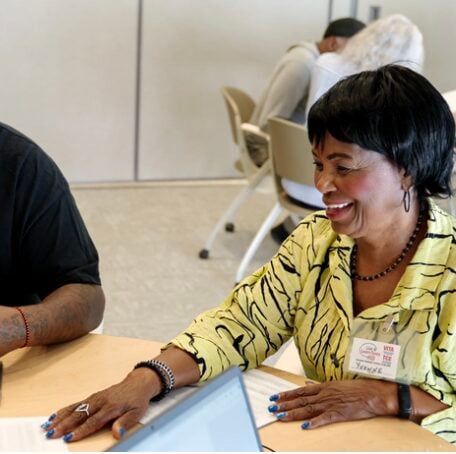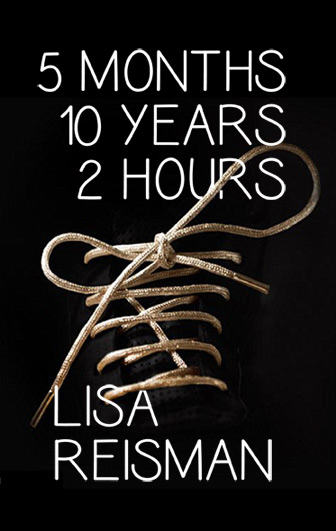In 1998, Lisa Reisman — a successful, 32-year-old attorney — realized the law was not her calling. After four years at a prestigious New York firm, she vowed to quit and drive cross country in a flame-red convertible while figuring out her next move. One week before she officially left her job, however, the plan began to unravel.

After work on a Friday, she met some colleagues for a drink and then went home around midnight. The next morning, she took a 5-mile run through Riverside Park and returned to her apartment, hot, spent, ready for a shower. There was a brief phone call from her older sister, Luke, but Lisa kept the conversation short and promised she’d call back after a nap.
Forty-six hours later, after a series of unanswered phone calls from family and friends, and frantic failed attempts to gain entry to the apartment, her step-mother was finally able to get a key. Today, Lisa can imagine the staccato click of her stepmother’s heels, rushing into the apartment to find her near death, but she doesn’t actually remember anything of that lost weekend.
After the call to 911, Lisa was rushed, unconscious, to the hospital. When she awakened to see the strained faces of her long-divorced parents, her sister and brother-in-law, she had no idea that she’d suffered a massive seizure.
The cause was a brain tumor. “It’s glioblastoma. Multiforme. Grade 4,” the surgeon announced after surgery. Radiation would not be enough. Aggressive chemotherapy was required.
“Not necessarily a death sentence, no absolutely not, not at all,” she was told, but palliative care was a possibility, “If it comes to that,” the doctor added.
Lisa tells her story in a riveting memoir, 5 Months, 10 Years, 2 Hours. I received my copy of the book on Thursday, and started reading it right away. After 75 pages, I finally had to put it aside and go about the rest of my work day. That night, I stayed up past midnight to finish.
Even though I know Lisa and had heard her story seven or eight years ago when we were both in residence at an artists’ community, I could not put her book down. She’d read excerpts during our stay at the Ragdale Foundation and explained that the manuscript, in spite of its compelling story, had been rejected by more than one publisher. If I recall correctly, one of the editors who reviewed a draft said something akin to, “Just another brain tumor story won’t sell.”
Tell Lisa Reisman she can’t do something, and you’ll find out what she’s made of. There are no platitudes or pink ribbons in the book, no easy aphorisms. She found a way to tell her tale by relying on the traits that define her in sickness and in health. Lisa is stubborn, athletic, witty, competitive, and smart, not one to give in or give up. She endured rigorous treatment for cancer, and when she was finally given an “all clear” she was determined to celebrate every year of good health after that.
At the 10-year mark, she decided to train for a triathalon, and it is that process that provides the underlying structure of 5 Months, 10 Years, 2 Hours. The first section, titled “Swim,” moves easily back and forth in time, from the choppy waters of Long Island Sound in 2008, back to the days in 1998, leading up to and including the seizure and devastating diagnosis.
She recounts events without self-pity, deftly weaving in background about her family dynamics and exposing her self-deprecating wit and unrelenting perfectionism. “Had to be the star patient,” she told herself the first day she regained consciousness from the seizure. She wanted to be “the one everyone vied to check in on, who would be remembered long after she was gone. Have you met Lisa Reisman in Room 722-A? She’s incredible. You have to talk to her.”
The book goes from “Swim,” to “Bike,” to “Run,” ending at “Finish Line,” and even knowing the outcome in advance did not slow this reader’s momentum. The writing is spare, without frills, and it keeps up a steady pace, with just enough description and vivid language to enthrall. At the end, Lisa admits that the triathalon was a manufactured struggle that propelled her to turn the adversity she faced outward. “Now I could use the strength I had gained to make a difference, even if it was only in one tiny corner of the world.”
Lisa Reisman avoids the temptation to romanticize her story, and in so doing she demonstrates that her approach to her own caregiving – tough love – is a winner in the end.
For more information about the author, log on to www.LisaReismanAuthor.com. Published by Outpost 19, 5 Months, 10 Years, 2 Hours is available in paperback and ebook formats, through Amazon, Barnes & Noble and independent booksellers.
Constance Alexander is a faculty scholar in the Teacher Quality Institute at Murray State University. She is also a freelance writer.



















